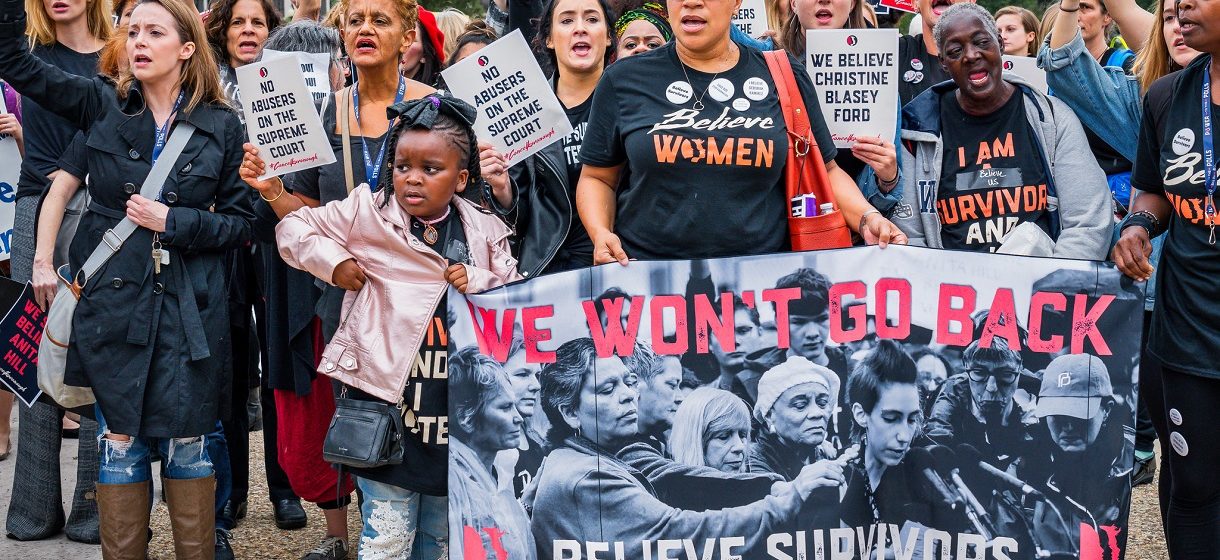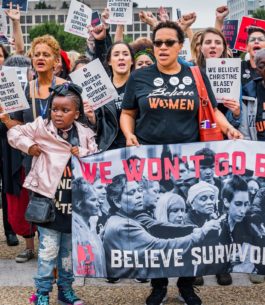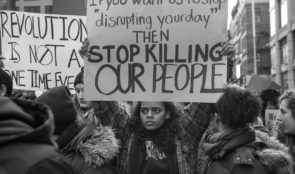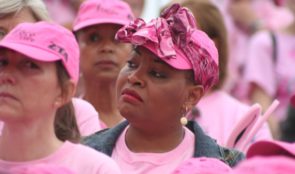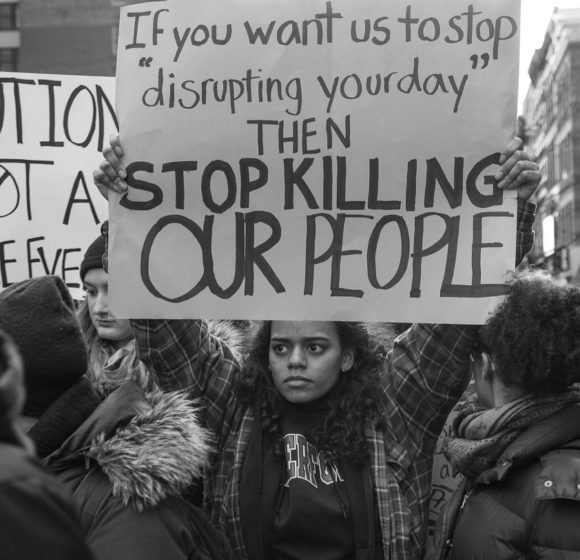Perhaps it was the gesture of Sen. Orrin Hatch (R-Utah) “shooing” away women sexual assault survivors and admonishing them to “grow up” in response to their protests that has moved the dial permanently.
Perhaps it was the fallout of condemnation from many politicians and observers after President Donald Trump at a rally mocked the verbal responses of Dr. Christine Blasey Ford during the recent Brett Kavanaugh senate confirmation hearings. He mimicked her feminine voice and gestures, hijacking the stereotype.
This was in contrast to Democratic Senators Kamala Harris of California and Cory Booker of New Jersey referring to her as brave, courageous, and “nothing more than heroic.”
She was called a hero because she told her truth to a nation.
The Hatch and Trump comments as well as the cheers and applause from the crowd at Trump’s rally reinforce the conditioning women receive from early in their childhoods to be small, demure and not rock the boat.
But the new videos of hundreds of women at the Hart Senate Office Building shouting and protesting—and getting arrested—demonstrate that women may not be compliant with silence. The results of the vote for confirmation may also impact the upcoming mid-terms.
This has not been a swift or simple shift in behavior.
For the past 20 years, as a certified women’s leadership coach and Empowerment Self Defense instructor (ESD) I have advised and trained over 1,500 women to navigate difficult conversations and speak their truth.
These women have ranged from business professionals, health care workers, thought leaders, college students, wives and young people. When I ask a group of women to define typical male and female characteristics, they consistently provide stereotypical depictions of what it means to be men and women in our society.
Routinely they list men as “strong, bread winners, independent, athletic, competitive, aggressive, dominant, unemotional, distant, and smart.”
Many depict women as “kind, nurturing, weak, mothering, dependent, emotional, care taking, appearance focused,” with the occasional mention of “smart and sassy.”
Participants then comment how the masculine list is more about power and strength while the feminine list is about docility and dependence. While we all know these are gender-biased stereotypes, participants recount stories of how they impact their self-perceptions and their capacity to speak up for themselves and name and speak their truth.
For women, much more so than men, there is an over use of verbal ‘diminishers,’ what I define as words or phrases that minimize or call into question the power of what women are trying to say. For the past few years, research has emerged on how some women speak in ways that can be undermining, while other research unpacks gendered speech patterns.
It is clear that verbal ‘diminishers’ take power away from what a person is trying to say.
For instance, using a question tag at the end of her sentence—“The media is biased against women, isn’t it?”—a woman diminishes a sense of conviction in her statement. By using diminutive words such as just, kind of, sort of or introducing thoughts with “I kind of have a question to ask,” a women takes away her own power.
These words and phrases have become so normative for women, many continue to assume women lack a sense of agency, power or truth.
These verbal ‘diminishers’ echo my own struggles to find my voice.
In my mid-20s, I had often minimized what I wanted to say, especially with those in authority, as I needed their acceptance and approval to feel good about my work and myself.
Without my knowing, these diminishers helped me to be non-confrontational, unopinionated, and hiding behind my truth. It took me until my early 40’s before I saw how much of my power I was giving away to others to define my sense of self.
By overusing diminishers, I had continued to rely on others rather than myself to step into my confidence, power, and self-worth.
Now, in my 50s, I see that it’s a catch-22 for women, especially in the corporate setting.
To be seen as powerful and speaking one’s truth, a woman often needs to display a sense of toughness and aggressive power—to interrupt, get your point across, and hold her ground at all costs.
This is a tricky balance for women, especially those deeply set inside socially constructed norms for what it means to be feminine. The recent uproar over Serena Williams’ court-side discussion with an umpire led to a dispute as to whether she displayed unsportsmanlike behavior or was simply taking a stand.
Often when a woman speaks up in a bold and assertive voice, she will be perceived as too aggressive and called the “B” word—shorthand for bossy or bitchy. However, if she doesn’t speak up by minimizing her voice, then she is seen as passive. It becomes difficult, then, to know how to “lean in” to the negotiations and take up space around the table.
What is courageous and brave about Dr. Ford’s testimony and all of the survivors speaking up and speaking out in defense of truth, has perhaps less to do with the truth itself, and more about the way it is expressed.
Dr. Ford demonstrated what speaking up for a woman could look like—authentic, bold, clear, concise, conciliatory, eager to please and fully present, authentic, and yes, brave.
May millions of women follow her lead.
Dr. Kate Webster is the Director of Student Diversity & Multicultural Affairs and an Adjunct Associate Professor at Rush University, a prior third degree Black Belt and certified Empowerment-Based Self-Defense Instructor. She is a Public Voices Fellow through The OpEd Project.
Photo Credit: Mobilus In Mobili
Worth your time
- Non Gamstop Casinos UK
- Best Non Gamstop Casinos 2025
- Non Gamstop Casinos UK
- Non Gamstop Casinos UK
- Casinos Not On Gamstop
- Casinos Not On Gamstop
- Casino Not On Gamstop
- Casino Italiani Non Aams
- Online Casino Canada
- Non Gamstop Casinos Uk
- Best Non Gamstop Casinos
- Meilleur Casino En Ligne France
- Casino Sites Not On Gamstop
- Non Gamstop Casino Sites UK
- Casino Online Non Aams
- Casino Sites Not On Gamstop
- Non Gamstop Casinos
- Meilleur Casino En Ligne France
- Meilleur Casino En Ligne Francais
- Casino Sites Not On Gamstop
- Non Gamstop Casinos UK
- Casinos Not On Gamstop
- Migliori Siti Casino Non Aams
- Meilleur Casino En Ligne
- Casino Non Aams
- Meilleur Casino En Ligne Belgique
- Siti Non Aams
- Tennis Paris Sportif
- Site De Paris Sportif En Ligne
- Casino En Ligne France
- Sweet Bonanza Avis
- ブック メーカー おすすめ
- Online Casino App Real Money
- Casino Français En Ligne
- Casino Italia Non Aams
- Meilleur Casino En Ligne Belgique
- Meilleurs Casino En Ligne
- Nouveau Casino En Ligne
- Casino Con Crypto
- Best Crypto Casino


